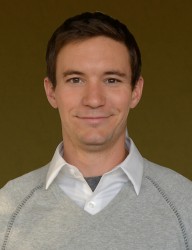
Andrew Steigerwald is trading a Vanderbilt physics laboratory for the halls of Congress.
The post-doctoral researcher has been selected by the Materials Research Society (MRS) and the Minerals, Metals and Materials Society (TMS) as their 2012-2013 Congressional Science and Engineering Fellow. Starting in September he will spend a year working as a special legislative assistant on the staff of a member of Congress or congressional committee.
“I hope I can use my technical background to make a bigger impact than I can in a laboratory setting,” Steigerwald said. “I enjoy working on large-scale complex problems. I also enjoy policy issues and it is clear that we need more people with advanced science and technology backgrounds actively engaging in the policy-setting process.”
The fellowship will begin with an intensive science policy orientation facilitated by the American Association for the Advancement of Science (AAAS) for executive branch fellows and congressional fellows from more than three dozen scientific societies. Next, Steigerwald will go through an interview and selection process with offices of senators, representatives or committees on Capitol Hill. Offices will extend offers and he will choose the office in which he will spend his fellowship year. During their tenure, fellows typically conduct legislative or oversight work, assist in congressional hearings and debates, prepare briefs and write speeches as a part of their daily responsibilities.
“The Congressional Fellowship program is an important investment by MRS,” said Kevin Whittlesey, MRS Congressional Fellows subcommittee chair. “Science plays a role in many public policy issues, so the science community has a responsibility to provide expertise that will help inform policy makers. At the same time, the fellowship program provides our scientists with an educational experience in public policy. Steigerwald has a strong materials science background and the communications skills to apply his training to Capitol Hill. He will be a great asset as legislative staff.”
Steigerwald earned a bachelor of engineering degree from Ohio State University, a master’s degree from Fisk University and a doctoral degree in Interdisciplinary Materials Science and Engineering from Vanderbilt University as an National Science Foundation (NSF) Integrative Graduate Education and Research Traineeship (IGERT) fellow. Following his Ph.D., Steigerwald continued as a post-doctoral researcher at Vanderbilt, working with Professor of Physics Norman Tolk.